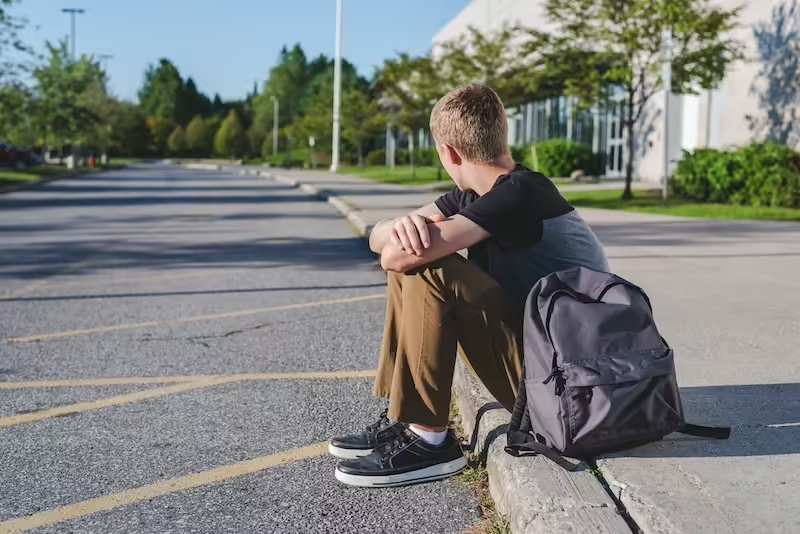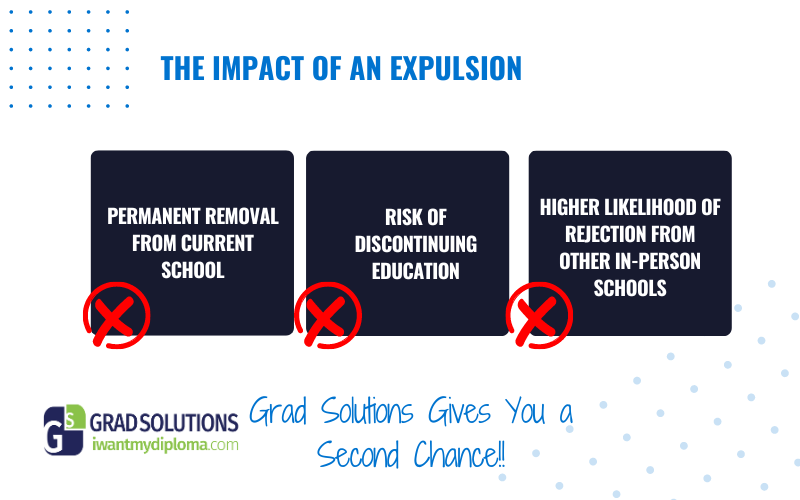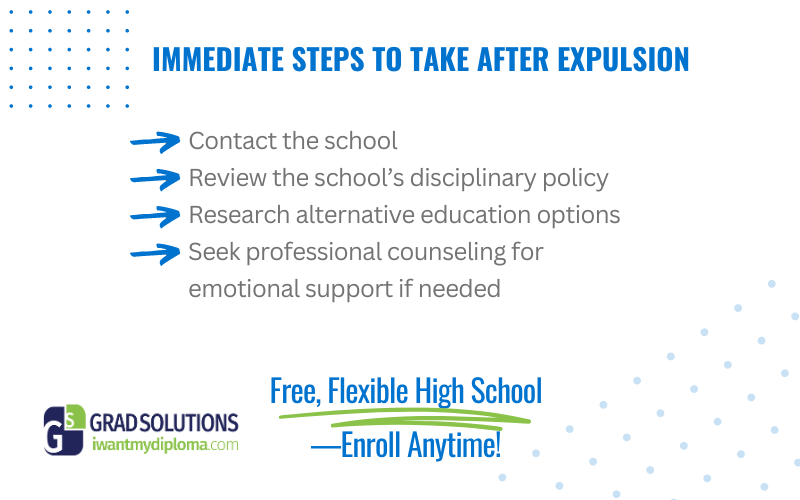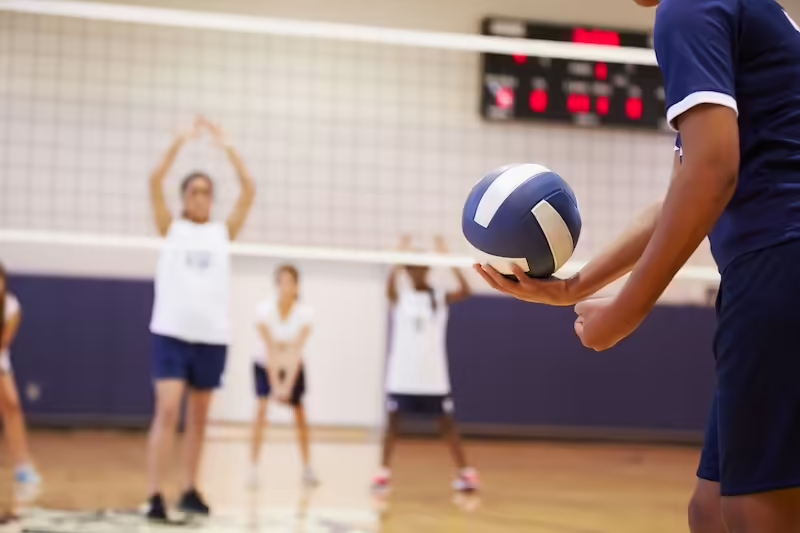Online School
What To Do If Your Child Gets Expelled From School: Next Steps for Parents and Guardians

Facing the news that a child has been expelled from school can be an overwhelming and stressful experience for any parent or guardian. It’s a situation that can stir up several different emotions—shock, frustration, and concern for your child’s future. However, it’s crucial to remain calm and proactive.
This blog aims to guide you through this challenging time, offering actionable steps and valuable resources to help you navigate the aftermath of expulsion. We believe that every setback offers an opportunity for a comeback. With the right approach, you can find the right solutions to ensure your child continues their education and completes high school.
In short, this blog is designed to empower you with the knowledge and tools needed to respond to an expulsion and provide you with a roadmap to help your child get back on track.

Understanding Expulsion
In Arizona, having a child expelled from school is a significant event. It often comes with consequences that stay with the student even after switching to another school. Expulsion is defined as the removal of a student from their regular school setting for an extended period, often for the remainder of the school year or longer.
This disciplinary action is typically reserved for repeated suspensions and severe infractions. It is a last resort after other interventions have failed. Unlike a short-term suspension, which is a temporary removal from school grounds for a shorter period, usually a few school days to a couple of weeks, expulsion is a permanent exclusion from the student’s current school premises.
Several infractions can eventually lead to expulsion in Arizona. Behavioral issues, such as repeated aggressive behavior or threats to other students or staff, are common grounds for expulsion. Drug and alcohol violations, including possession, use, or distribution of controlled substances on school property, are also serious offenses that can lead to expulsion. Any criminal offense will also be reported to law enforcement, as required by law. Schools also have the discretion to advise police of other incidents that may constitute a crime. Any action taken by law enforcement is separate from school disciplinary action.
Additionally, absenteeism and truancy—habitual or prolonged absence from school attendance without valid justification—can result in expulsion if they reflect a broader pattern of disengagement or defiance.
The process leading up to an expulsion typically involves several steps and is designed to ensure that the decision is fair and justified. Schools in Arizona follow a series of disciplinary interventions before considering expulsion. These can include meetings with parents and guardians, counseling, behavioral contracts, and suspensions. If these measures fail to resolve the issue, the school may initiate the expulsion process, which involves a formal hearing.
Expulsion Hearing
During the expulsion hearing, the student and their parents or guardians can present evidence and argue their case. The decision to expel a student is usually made by a disciplinary school board or the school district’s governing body on a case-by-case basis. This process is intended to ensure that expulsion is used only when necessary and that student’s rights are protected.
Consequences & Emotional Impact on a Student
Expulsion from school can have an emotional and psychological impact on a student. Emotionally, an expelled student might struggle with low self-esteem, anxiety, and depression. They may feel stigmatized by their peers and community, leading to a sense of alienation. Although the student may not outwardly show it, the disruption of their routine and loss of connection with peers and familiar connections can cause a decline in their overall well-being.
Given these potential effects, a student’s parent or guardians must provide emotional support and understanding to help their child navigate this difficult time. Open communication is key, allowing the student to express their feelings and concerns without judgment. Seeking professional help, such as counseling or therapy, can be beneficial in addressing the emotional and psychological challenges the student may face. Professional support can offer coping strategies, help rebuild self-esteem, and guide the student in setting new goals and pursuing alternative educational pathways. Ensuring that the student feels supported and understood is essential in helping them regain confidence and motivation to continue their education and personal growth.

Immediate Steps to Take After Expulsion
When a child has been expelled from school, family members and guardians must stay involved throughout the process. They should work to meet with school administrators and gain a clear understanding of the disciplinary reasons behind the expulsion. Many schools will organize an expulsion hearing where a hearing officer may recommend additional disciplinary action. Getting an understanding of the hearing procedures and attending the hearing is important because the outcome can affect their student for years to come.
In addition to speaking with school administrators, parents and guardians should review the student handbook and the school discipline policy, often called the Discipline Matrix. Every school district has a formalized process for applying consistent disciplinary action. Familiarizing themselves with these policies and procedures can be critical when preparing for an expulsion hearing.

Alternative Education Options
When a student is expelled from school, it may seem like their educational path has been derailed, but there are numerous alternative education programs available that can provide them with the opportunity to continue their learning journey. Parents and guardians can take comfort in knowing that there are solutions that cater to different learning styles and needs.
Private Schools
One viable option is enrolling in a private school. Private schools often have different disciplinary policies and may offer a more personalized learning environment that can be beneficial for students who struggle in traditional public school settings. Many private schools offer smaller class sizes, specialized programs, and a supportive community that can help students rebuild their confidence and academic skills. However, the student’s school record, including behavioral record, may be considered when applying for a private school.
Homeschooling
Homeschooling is another flexible alternative school option that allows parents or guardians to tailor the educational program to the student’s unique needs and interests. This option can provide a supportive and distraction-free environment where students can learn at their own pace and focus on their strengths. Parents can use a variety of resources, including curriculum guides and online platforms, to ensure their child receives a comprehensive education.
Online School
Online schools are also a great choice for students who thrive in a more self-directed learning environment. An advantage for students who have been expelled is that the student’s behavior record is less relevant and therefore less of a consideration when applying to online school.
Online schools offer flexibility in scheduling and coursework, allowing students to learn at their own pace and in a setting where they feel most comfortable. Online schools often provide a wide range of courses and interactive resources, enabling students to pursue their interests while meeting educational requirements. One such program is Grad Solutions, which offers a flexible, free alternative for students seeking to complete their high school education.
Ultimately, while expulsion can be a challenging experience, it also presents an opportunity to explore educational options that may better suit a student’s needs. With the variety of alternatives available, parents and guardians can find solutions to ensure their student receives a quality education and is prepared for the future.

Tips for Going Back to School After Expulsion
While a student will not be able to re-enter the same school or even the same school district after an expulsion, they may attend a new school. Returning to school after an expulsion can be a challenging transition for both students and parents/guardians. To ensure a successful re-entry, it is essential to provide ongoing behavioral and academic support to avoid a repeat of past behaviors.
Behavioral and Academic Support
One of the first steps in supporting your child is to identify and address any underlying issues that may have contributed to the expulsion. Counseling can be instrumental in helping your child process their emotions, develop coping strategies, and address any behavioral concerns. Additionally, behavior management programs can offer valuable tools and techniques for improving self-regulation and decision-making skills.
Communication and Monitoring
Open communication with your child is crucial for monitoring their progress and addressing any concerns that arise. Regularly check in with your child about their experiences at school and encourage them to share their thoughts and feelings. Use tools like academic planners, progress reports, and parent-teacher meetings to stay informed about their academic and social progress.
Engaging in Extracurricular Activities
Encouraging your child to participate in extracurricular activities can have numerous benefits. Involvement in school-sponsored activities, sports, clubs, or hobbies can promote positive behavior, enhance social skills, and build self-esteem. These activities provide opportunities for your child to develop new interests, make friends, and experience success outside the classroom.
Grad Solutions: A Lifeline for Expelled High Schoolers
Expulsion from high school can seem like a setback, but it doesn’t have to mark the end of a student’s educational journey. Grad Solutions offers an invaluable lifeline for expelled high schoolers, providing them with a fresh start and the opportunity to complete an individualized education program in a supportive and flexible environment.
Designed to cater to the unique needs of students who have faced academic or disciplinary challenges, Grad Solutions empowers students to regain control of their academic path and work towards achieving their high school diploma.
Grad Solutions also provides comprehensive educational services and support through mentoring, counseling, and tutoring services. The self-paced nature of the program further enables students to progress through coursework at their own speed, accommodating their individual learning styles and helping them build confidence in their abilities.
Grad Solutions is a free program that removes financial barriers that might otherwise prevent students from continuing their education. This accessibility ensures that every student, regardless of their circumstances, has the opportunity to pursue their high school diploma and improve their future prospects.
For those facing the uncertainty of expulsion, Grad Solutions provides hope and a clear path forward. It serves as a reminder that setbacks are not the end of the road but rather an opportunity for growth and new beginnings. By embracing the resources and support offered by Grad Solutions, students can overcome challenges and work towards a brighter future.
If your child has been expelled and is seeking a way to continue their education, consider exploring the opportunities available through Grad Solutions. Visit their website to learn more about their programs and services and take the first step toward enrollment. With Grad Solutions, expulsion is not the end—it’s the beginning of a new chapter in your child’s educational journey.
With the right support and resources, your child can successfully navigate the transition back to school and continue to grow academically and personally. By working together, parents and schools can create a nurturing environment that promotes resilience and success.
Despite the initial challenges, there are multiple pathways and flexible solutions available to help your child re-enroll in a new school or program and complete their high school education. With determination and the right resources, your child can continue to pursue their academic goals and build a promising future.